
The Nasdaq Stock Market is an American stock exchange based in New York City. It is the most active stock trading venue in the US by volume, and ranked second on the list of stock exchanges by market capitalization of shares traded, behind the New York Stock Exchange. The exchange platform is owned by Nasdaq, Inc., which also owns the Nasdaq Nordic stock market network and several U.S.-based stock and options exchanges.

The Nordic Council is the official body for formal inter-parliamentary Nordic cooperation among the Nordic countries. Formed in 1952, it has 87 representatives from Denmark, Finland, Iceland, Norway, and Sweden as well as from the autonomous areas of the Faroe Islands, Greenland, and Åland. The representatives are members of parliament in their respective countries or areas and are elected by those parliaments. The Council holds ordinary sessions each year in October/November and usually one extra session per year with a specific theme. The council's official languages are Danish, Finnish, Icelandic, Norwegian, and Swedish, though it uses only the mutually intelligible Scandinavian languages—Danish, Norwegian, and Swedish—as its working languages. These three comprise the first language of around 80% of the region's population and are learned as a second or foreign language by the remaining 20%.

Burgundy is a historical territory and former administrative region and province of east-central France. The province was once home to the Dukes of Burgundy from the early 11th until the late 15th century. The capital, Dijon, was wealthy and powerful, being a major European centre of art and science, and of Western Monasticism. In early Modern Europe, Burgundy was a focal point of courtly culture that set the fashion for European royal houses and their court. The Duchy of Burgundy was a key in the transformation of the Middle Ages toward early modern Europe.
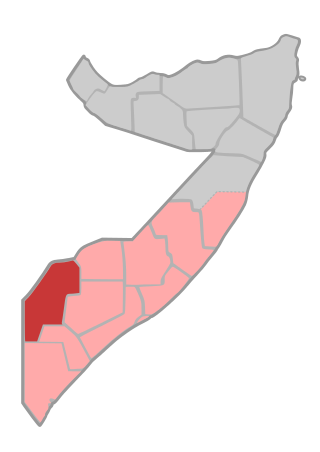
Gedo is an administrative region (gobol) in Jubaland, southern Somalia. Its regional capital is Garbahaarreey. It was created in 1974 and is bordered by the Ogaden in Ethiopia, the North Eastern Province in Kenya, and the Somali regions of Bakool, Bay, Jubbada Dhexe, and Jubbada Hoose further down east. The southern parts of Gedo, west of the Jubba River, used to be part of the old British Trans-Juba region during half of the seventy years of colonial era in Africa from 1890 to 1960. The British and Italians fought twice over this area. The first democratically elected governor of the administrative region was Hussein Farey, who entered office in 2008.

Nasdaq Nordic is the common name for the subsidiaries of Nasdaq, Inc. that provide financial services and operate marketplaces for securities in the Nordic and Baltic regions of Europe.

Nasdaq Stockholm, formerly known as the Stockholm Stock Exchange, is a stock exchange located in Frihamnen, Stockholm, Sweden. Founded in 1863, it has become the primary securities exchange of the Nordic countries. As of March 2021, a total of 832 companies are listed on Nasdaq Stockholm with 385 companies on the main market and additional 447 listed on secondary markets.
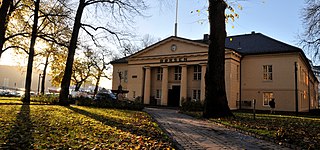
Oslo Stock Exchange is a stock exchange within the Nordic countries and offers Norway's only regulated markets for securities trading today. The stock exchange offers a full product range including equities, derivatives and fixed income instruments.
The Nasdaq Tallinn AS, formerly known as the Tallinn Stock Exchange, is a stock exchange operating in Tallinn, Estonia. Nasdaq Tallinn is the only regulated secondary securities market in Estonia. The major stock market index is Nasdaq Tallinn, formerly known as TALSE.

The Ministry of Foreign Affairs of Denmark and its overseas representations are in charge of the Danish Realm's foreign policy and relations. Among these tasks are policy towards the Arctic Council, European Union, Nordic Council, development aid, trade policy and legal affairs in relation to the outside world.
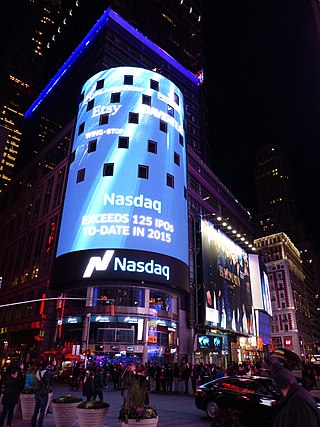
Nasdaq, Inc. is an American multinational financial services corporation that owns and operates three stock exchanges in the United States: the namesake Nasdaq stock exchange, the Philadelphia Stock Exchange, and the Boston Stock Exchange, and seven European stock exchanges: Nasdaq Copenhagen, Nasdaq Helsinki, Nasdaq Iceland, Nasdaq Riga, Nasdaq Stockholm, Nasdaq Tallinn, and Nasdaq Vilnius. It is headquartered in New York City, and its president and chief executive officer is Adena Friedman.
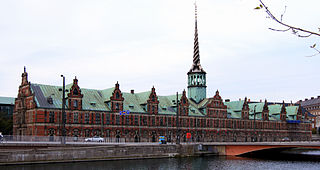
The Nasdaq Copenhagen, formerly known as the Copenhagen Stock Exchange, is an international marketplace for Danish securities, including shares, bonds, treasury bills and notes, and financial futures and options.
Armenia Securities Exchange (AMX), formerly NASDAQ OMX Armenia, is the only stock exchange currently operating in Armenia. It is located in Yerevan, the capital city. The state regulatory authority for the stock exchange and the Armenian securities market is the Central Bank of Armenia (CBA). Instruments currently traded on AMX include stocks, corporate bonds, government bonds, currency, SWAP and REPO on corporate securities.

The Nordic model comprises the economic and social policies as well as typical cultural practices common in the Nordic countries. This includes a comprehensive welfare state and multi-level collective bargaining based on the economic foundations of social corporatism, and a commitment to private ownership within a market-based mixed economy—with Norway being a partial exception due to a large number of state-owned enterprises and state ownership in publicly listed firms.

A Norwegian passport is the passport issued to nationals of Norway for the purpose of international travel. Beside serving as proof of Norwegian citizenship, they facilitate the process of securing assistance from Norwegian consular officials abroad.

Finnish passports are issued to nationals of Finland for the purpose of international travel. Aside from serving as proof of Finnish nationality, they facilitate the process of securing assistance from Finnish consular officials abroad.

Swedish passports are issued to nationals of Sweden for the purpose of international travel. Besides serving as proof of Swedish citizenship, they facilitate the process of securing assistance from Swedish consular officials abroad.

The Rehn–Meidner model is an economic and wage policy model developed in 1951 by two economists at the research department of the Swedish Trade Union Confederation (LO), Gösta Rehn and Rudolf Meidner. The four main goals to be achieved were:
The European Multilateral Clearing Facility (EMCF) was a clearing house based in the Netherlands for equity trades done on stock exchanges or multilateral trading facility throughout Europe.
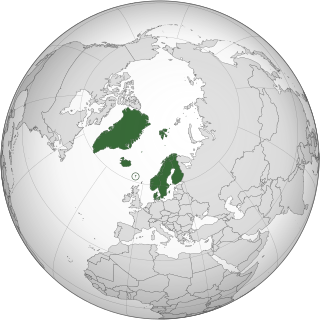
The Nordic countries are a geographical and cultural region in Northern Europe and the North Atlantic. It includes the sovereign states of Denmark, Finland, Iceland, Norway and Sweden; the autonomous territories of the Faroe Islands and Greenland; and the autonomous region of Åland.

Iceland–Sweden relations refers to the diplomatic relations between Iceland and Sweden. Both nations are Nordic countries and are members of the Arctic Council, Council of the Baltic Sea States, Council of Europe, Nordic-Baltic Eight, Nordic Council, Organisation for Economic Co-operation and Development, Organization for Security and Co-operation in Europe, and the United Nations.
















